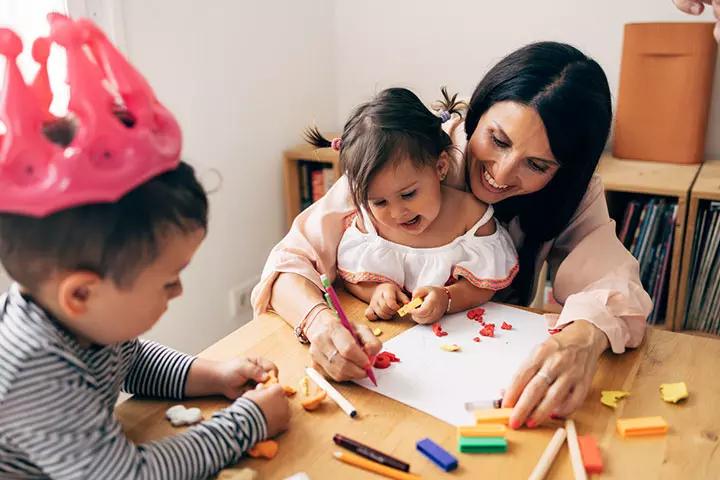
Image: iStock
Motherhood consists of a number of innate traits that make her right for the job. It is a self-learned journey, and the protective and caring instincts come naturally to her and are not acquired. So if you are pondering over how you can improve as a mother, stop worrying and go with the flow. You will eventually know what your child wants and what works for them. However, if you want to adopt certain qualities that can be helpful for your child, then this post brings you key traits that reflect motherhood.
Key Pointers
- A mother is a role model for her kids and is always their first love.
- Patience, respect, unconditional love are a few of the many attributes of a good mother.
- Along with taking care of her children and family, a mother needs to take care of herself as well.
15+ Characteristics Of A Good Mother
Here are some of the inspiring characteristics of a good mother that can guide you.
1. Role model
You brought your child into this world, and you are their first point of contact, it’s natural that they look up to you. Being a strong parent might feel difficult, but if you want your child to grow up to be a good person, you too have to practice those behaviors as they will learn from you.
 Point to consider
Point to consider2. Source of love and affection

Shower them with kisses and hugs, as children who constantly get selfless affection from their parents tend to have a healthy mind and body. Studies have also shown that it helps in the proper brain development of your child (1). When you are caressing and affectionate to your children while caring and nurturing them, they will be happier and more successful as adults (2).
 Quick tip
Quick tip3. Problem solver
Kids see and learn everything that their parents do. Whenever there is a problem or if they do something wrong, make them politely understand what is right or wrong instead of scolding them. They will learn the way you deal with problems in life and adapt your wise sense of judgment.
4. Patient
Motherhood is a beautiful experience, but it can also be quite taxing on your emotional and physical well-being
. After completing a series of chores, finding your child has spewed milk all over the floor might make you feel stressed out and frustrated. Patience is key here, understand that hurtful words will not solve the situation. Be calm and resolve the situation.
 Point to consider
Point to consider5. Forgiver

Your kids will make mistakes as they grow up, you need to understand this and forgive them. Forgiveness is not an easy task to do, even adults have a hard time forgiving. However, when your child sees your kind and forgiving nature towards them, they too will acquire the trait from you while growing up.
6. Respectable
Respect is important in any relationship, even as a parent, you should respect your child. Understand that they are growing and learning. If they have a different opinion than you, it does not mean they are wrong. You have to be understanding towards them and respect their opinions as well.
7. Tutor
A mother is the first teacher of a child. Your children don’t know what you expect from them unless you express it. Setting some ground rules right from their foundation years will make them understand their boundaries. Be consistent with your rules, changing them frequently could confuse them.
 Point to consider
Point to consider8. Optimistic
Generous positive reinforcement is the way to go whenever your child makes a mistake. Instead of criticizing them about what they have done, focus on what they should do next to correct their mistakes. It helps in disciplining their behavior.
9. Strong and resilient

Your child will look up to you for almost everything. Being their mother, you have to be strong, reliable, and resilient even when under stress. You will be the one to comfort them and the supportive pillar for them, when they are at their lowest. So if you don’t find strength in yourself, you cannot help your child.
10. Disciplined
Kids are naturally curious seekers. Losing your temper when they mess up will make them stubborn. Being their mother, understanding that instilling fear is not the answer here. Teaching them how to be disciplined is important, and that too in a non-violent manner.
11. Friend
The goal of motherhood is not to be their child’s friend. A mother must fulfill their duty as a parent and a caregiver first until they reach adulthood while being loving and compassionate.
12. Humility and vulnerability
Humility is a virtue that most people forget. Be humble, and they will learn it from you and become a good person growing up. Vulnerability is important too, as it shows children that it’s okay to ask for help and talk about their struggles. This openness builds a deeper connection and empathy between you and your child.
13. Sense of humor

People tend to look for a partner who has a good sense of humor. Now is the time to cultivate the same for your child. Instead of being serious and strict with them all the time, having a sense of humor will only strengthen the bond between you both.
14. Adjustable
If your kid is young, it might seem too early to teach them basic survival skills such as cooking, doing their own laundry, cleaning up their bedroom, and many such things. As a mother, you should teach them these skills as they grow older. They will thank you later on in life.
Mandy Law, a motherhood and parenting blogger and a mom of two, shares the essential life lessons and skills she learned from her mother. Expressing gratitude to her mom for the cooking skills she acquired, Law writes, “When I was little, she would ask me to help in the kitchen, chopping the onions, garlic, pounding the spices, and I would watch her cook every day. She believes home-cooked meals are the best and much healthier. With my culinary skills today, I enjoy cooking & baking because it’s a joy to cook for the family (i).”
15. Artistic

Many kids like a particular form of art or sport from a young age. When children engage in activities they enjoy, they will learn. This way, they can hone their artistic skills, and who knows, they might even turn out to be a prodigy.
16. Attentive
A good mother is always attentive to her children’s needs. Being attentive involves paying close and thoughtful attention to the child’s emotions, behaviors, and overall well-being. A good mother is attuned to her child’s cues, such as hunger, discomfort, or emotional distress, and responds promptly.
17. Complimentary
Being a good mother means saying nice things to her child and making them feel good about themselves. When they give compliments to their child, it boosts their confidence and self-esteem. Appreciating children’s good behaviors, saying they did a good job or that you are proud of them, will encourage them to repeat their deeds. Compliments make your bond stronger and create a positive home.
18. Self-Care
A good mother understands the value of self-care. By prioritizing your well-being, you become better equipped to care for your children. Maintain a healthy lifestyle with a balanced diet, good sleep, hydration, exercise, and personal time. Be kind to yourself, acknowledge your emotions, seek support from friends, and learn from your experiences to set a strong example for your children.
Frequently Asked Questions
1. Can a mother learn to be nurturing, or is it an inherent trait?
Nurturing is a quality that is often associated with motherhood, but whether it is an inherent trait or something that can be learned is a subject of debate. While some individuals may naturally be inclined towards nurturing behaviors, these qualities can also be developed through practice and learning. Here are a few tips on how to be a good mother.
2. How can motherhood change the personal traits of a woman?
Motherhood can profoundly change a woman’s personal traits, shaping her into a more responsible, nurturing, patient, resilient, and adaptable person. It can also help her develop a deeper perspective on life.
3. Can a mother’s parenting style affect a child’s personality traits?
Yes, a mother’s parenting style can significantly influence a child’s personality traits. How a mother interacts with her child, such as by providing emotional support, setting boundaries, and offering guidance, can impact the child’s self-esteem, emotional regulation, and social skills.
4. How important is empathy in a mother’s role?
Empathy is a crucial component of a mother’s role. It allows her to connect with her children, provide emotional support, and be attuned to their developmental needs.
5. Can a mother be assertive while demonstrating compassion?
Yes, a mother can assert herself in a loving and empathetic way by considering the needs and feelings of her child while still being firm in her expectations.
6. How can a mother encourage creativity and imagination in their children?
By providing a supportive and stimulating environment, a mother can help her children develop their creative and imaginative skills, serving them well throughout their lives.
7. How can a mother demonstrate responsible decision-making to her children?
By involving her children in the decision-making process, modeling thoughtful decision-making, and teaching them to take responsibility for their choices, a mother can demonstrate responsible decision-making and help her children develop important life skills.
8. How can a mother foster a bond with her children that creates strong relationships in the future?
By consistently showing love and support and being present in their lives, a mother can help build a strong foundation for a healthy and fulfilling relationship with her children.
9. Can a mother’s communication style affect the emotional development of her children?
Yes, a mother’s communication style can greatly affect the emotional development of her children. How a mother communicates with her child can shape the child’s emotional responses, social skills, and overall mental health.
10. How can a mother balance being a role model and a friend to her children?
To achieve this balance, a mother can actively engage in activities that promote both roles. For example, she can demonstrate positive behaviors, such as being kind and respectful to others, while being approachable and open to listening to her children’s problems.
These inspiring traits of a mother help us realize how mothers influence child development and the important role they play in their children’s lives. They support us during all our hardships and mold us to become better people with all the required good qualities. Therefore, you must appreciate all your mother does for you and ensure you express your love and gratitude for her. Further, playing the role of a mother can be emotionally and mentally taxing at times. Thus, it is also vital that mothers take some time out for themselves and indulge in self-care.
Infographic: Characteristics Of A Good Mother
Motherhood is an experience that does not come with a guide that one can refer to. It is highly self-taught and self-learned, which might, at times, turn out to be overwhelming. Thus, we hope our following infographic with a few characteristics can help you relate. Illustration: Momjunction Design Team
Illustration: Inspiring Characteristics & Key Traits Of A Good Mother

Image: Stable Diffusion/MomJunction Design Team
Are you feeling like your mother puts her needs before yours? Check out this video to learn 10 signs that you may have a narcissistic mother.
Personal Experience: Source
MomJunction articles include first-hand experiences to provide you with better insights through real-life narratives. Here are the sources of personal accounts referenced in this article.
i. Lessons I learned from my mom;https://mommywarrior77.blogspot.com/2020/05/lessons-i-learned-from-my-mom.html
References
- Why Does A Child Need Love And Affection?
https://www.skills.edu.eg/why-does-a-child-need-love-affection/ - How a Parent’s Affection Shapes a Child’s Happiness
https://spsp.org/news-center/character-context-blog/how-parents-affection-shapes-childs-happiness
Community Experiences
Join the conversation and become a part of our nurturing community! Share your stories, experiences, and insights to connect with fellow parents.
Read full bio of Nancy Fagan
Read full bio of Akshay Nair
Read full bio of Siddharth Kesiraju
Read full bio of Apoorva K





















